Best
Overall Beginner Digital Piano
-
Overall: Easy to use functions for beginners and advancing players
-
Best Feature: Action-packed a range of functions with over 600 tones and 190 styles
-
TedScore™: 10/10
Best
Value For Money
-
Overall: Specially designed hammers and crafted bass strings
-
Best Feature: Features 40 high quality voices including pianos, organs, and more
-
TedScore™: 10/10
Best
Digital Piano for Home
-
Overall: A lightweight piano that includes a professional keyboard action
-
Best Feature: Connect your devices with Bluetooth MIDI and audio
-
TedScore™: 8/10
Playing the piano might seem like an uphill battle. Imagine tackling something as huge as a mountain each time. But here’s the secret: it’s not as scary as it looks. Studies show that just 15 minutes a day can make a massive difference. Did you know that people who play an instrument are more likely to do better in school and have sharper memories? Plus, it’s a great way to chill and have some fun. Picture yourself improving little by little, like watching a tiny seed grow into a mighty tree. The brain really comes alive, forming new paths and getting smarter. Adults who enjoy music stand to gain the most, finding music to be a fantastic escape. With each note, there’s a chance to explore and express, making the journey worth every moment. Ready to take those first steps and discover what lies ahead?
It can feel like there’s always something you could be practising or that you’re “behind” the piano-playing skills of your peers. But doing Piano Practice helps you improve your playing and performance and help you play the music you love.
Knowing you’re interested in improving your piano skills is a great starting point. And if you’re looking for tips or advice on practising more effectively, this is your ultimate guide!
Having trained on piano at the Royal College of Music in London, I like to feel that I know a thing or two about the instrument; and how to get most out of your time whilst practicing.
In this article, I’ll discuss the best way to practice the piano, the common mistakes beginner pianists make when practising piano lessons, and the effective methods you can use to practice the piano and enjoy playing it even more.
Get ready to take your piano playing skill to a higher octave!

When and Where to
Practice the Piano?
If you’re practising the piano, you must consider your own body clock and schedule. This is essential to get the most out of practice sessions and develop a routine that you can rely on.
You can also structure your practice plan to improve your playing. It also includes practising in different keys and styles to develop an overall understanding of music.
To practice effectively, it’s important to have a practice space that’s comfortable and safe. Ideally, this space should be quiet and free from distractions so you can focus on practising the piano. It should also be well-lit and well-ventilated. Aside from piano playing lessons, you can also practice other activities such as reading music or writing notes.
The key is to practice regularly and be dedicated to improving your piano skills and abilities.
How Long Should Piano Practice Be?
Most experts agree that 20 minutes of piano practice is a great place to start for beginner pianists.
After that, players can gradually increase the length of their practice sessions according to their needs and abilities as they become more proficient and comfortable playing the piano.

In general, 20-30 minutes of practice per day is optimal for beginner and intermediate piano players, who can vary the length of their practice session according to their needs and abilities.
For those teaching themselves, 1-2 hours per day is recommended. Over time, this amount of time can become a habit and improve your piano playing skills and overall piano proficiency.
Should You Practice the Piano Every Day?
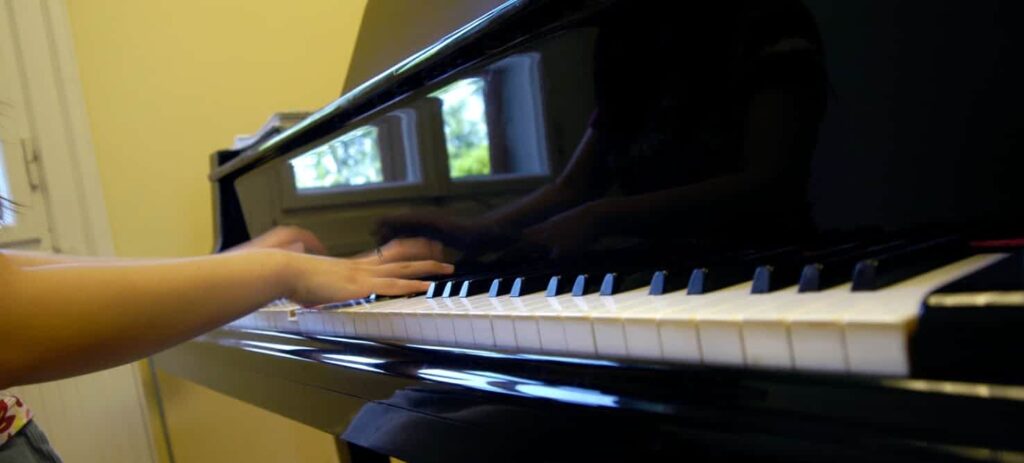
For beginners, practising daily is important for building good habits and developing a playing routine. Experienced players can take at least one day off per week for mental health benefits and to allow their minds to focus on other activities.
Practising away from the piano can also be beneficial. Short, 10-minute daily practice sessions are better than one long session per week. It’s also advisable to practice with a metronome in certain situations.
This can help you develop solid playing skills and a routine you can rely on.
It is also important to have a schedule for piano practice and keep track of your own chord progressions and achievements. This will help you stay motivated and improve your playing abilities.
Tips on Practicing Piano Effectively
Besides practising piano principles and methods, you can also use these helpful tips to be a part of your routine!
Tip 1: Set a Goal!
It’s important to set realistic and achievable goals for piano practice. It helps you stay motivated and focused during your practice session.
To practice effectively, it’s important to practice with full concentration and focus.
You can do this by listening carefully to the music and analyzing how you play it.
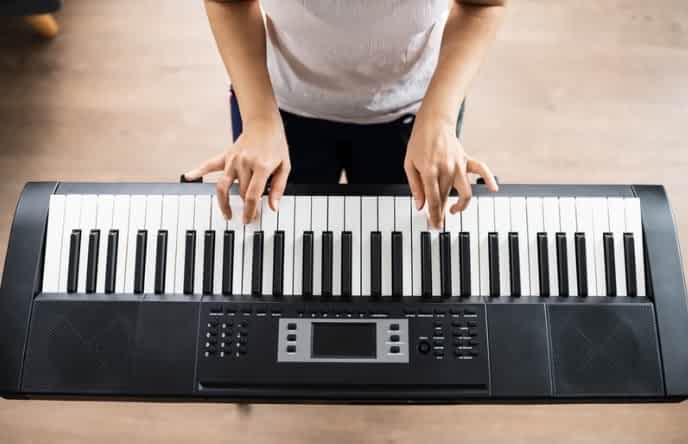
Tip 2: Come Up with a Piano Practice Routine
A daily practice routine is key to developing piano skills and achieving success. A routine should include playing the piano actively for at the right amount of time to ensure you can become proficient at the music you practice.
It should also include practising scales and arpeggios, practising short exercises, and analyzing music and challenging parts of the piano repertoire.

Tip 3: Stick to a Piano Practice Schedule
Setting a consistent practice schedule is crucial for your growth and development as a pianist. You don’t have to practice every day, but it’s important to decide how many days per week you want to practice and stick to it.
Why? Because consistent practice throughout the week is far more important than the number of hours you put into it. It’s better to practice every day for a few minutes rather than spend so many hours every weekend.

The technique is not as exciting as learning a new piece but will help you immensely on your piano-playing journey.
Tip 4: Try Recording and Listening to Yourself
Record yourself playing the piano and listen to the recording the next time you practice. It can be helpful to hear the music playback, allowing you to identify areas of improvement that you may have overlooked.
Moreover, playing the piano can sometimes be distracting while you are trying to practice; playing the music can help you stay focused and engaged. To stay inspired and improve your piano playing, try downloading a song you love and playing it repeatedly.
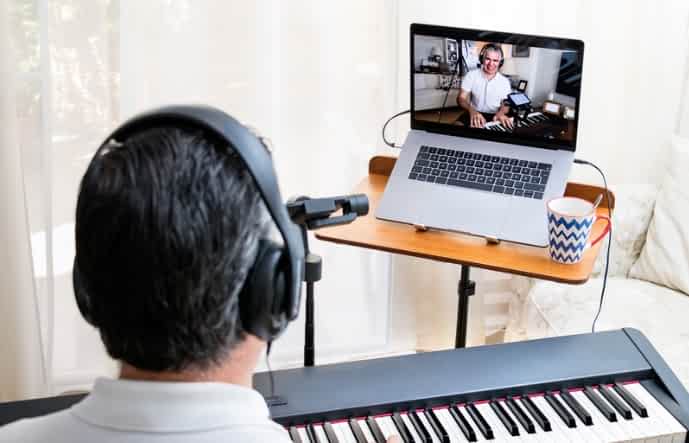
Setting goals and regularly measuring progress will help you reach your goal of becoming a great pianist.
Tip 5: Learn Important Piano Playing Technique
It’s vital to warm up your body and practice piano technique before practising. This can help you get the maximum benefit from your piano sessions.
It can help you play faster and more accurately by improving your hand and eye coordination and muscle strength.
Warm up by practising scales, arpeggios, and Hanon exercises. These exercises focus on the right and left hand and teach you how to play the piano effectively.

Also, consider taking a piano course to learn piano-playing techniques that are tailored to your skill level. Identify the technique you must work on and prioritize it over speed when practising.
Tip 6: Don't Rush & Appreciate your Progress
It can be challenging to practice the piano effectively. To improve your play, you must practice correctly and with the right techniques. One of the most important aspects of practising playing piano well is doing it slowly and paying attention to details.
When practising the piano, it’s best to take your time and work through the piece gradually rather than rushing through it to see how fast you can play.

Additionally, warming up your hands can help you play better by preparing them for the more difficult repertoire you will practice later on. It also helps you avoid injury and physical strain when practising.
By making time for piano practice a major priority in your schedule, you can ensure that you always have time to practice.
But be sure not to allow yourself the ‘luxury’ of mistakes, as they can cost you time and create uncertainty about your progress as a pianist.
Instead, appreciate the progress you make as you practice the piano effectively and continuously improve your skills over time.
Tip 7: Stay Focused During Practice
There is no doubt that piano practice can be a challenging task. To succeed, you need the right mindset and the willingness to practice regularly and consistently. You must stay focused and committed to the piano playing for the entire time you are practising. If you can’t practice for that long, you can break up your practice into shorter sessions of 15 minutes or less. The point is to practice the piano effectively and stay focused, all the while staying relaxed and enjoying the process of learning how to play the instrument.

Tip 8: It's Okay to Ask for Help
Seeking guidance from a teacher or a more experienced pianist can actually accelerate your progress and save you a lot of time and frustration.
Don’t be afraid to ask questions, request feedback, or seek advice on technique and practising strategies – these will help you avoid bad habits and hone your skills faster.
Moreover, playing the piano is not only a technical exercise but also a creative and expressive one.

So, receiving input from others can also give you fresh ideas and perspectives on interpretation and musicality. Remember that learning an instrument is a journey, and it’s perfectly normal to seek assistance and support along the way.
Most Common Mistakes When Practicing the Piano
Here are some of the top piano practice tips and mistakes you should avoid that can hinder your progress and affect your playing skills.
Mistake 1: Sticking to What You Already Know
It can be easy to stick to the same playing routine and practice the same things repeatedly. However, practising the same thing can lead to playing the piano the same way and not optimally developing your piano skills.
To avoid playing the same thing every time, you must practice different things and use different fingering to keep your practices interesting and stimulating.
Mistake 2: Playing with Incorrect Fingers

You should trust your sheet music for your fingering, as it helps develop muscle memory and lead to confident performances in front of others.
When practising a piece, you should play the correct fingers at the correct time and avoid focusing too much on the hand and finger movements.
This can help you to develop coordination and accuracy when learning the piece.
It’s important to practice the piece slowly and consistently, so you can develop a solid understanding of fingering and how it affects the music. Also, you can practice counting out loud to develop your rhythm and coordination between the hands.
You can develop confidence and control over your playing by doing the correct fingering, practising technique, and focusing on the music.
Mistake 3: Looking at Your Hands Often
Looking at your hands while playing the piano can affect your muscle memory, making it difficult to play without looking. However, keeping your glances at your hands during practice to a minimum can help you develop the muscle memory necessary to play.
Mistake 4: Practicing Fast
Make sure always to practice slowly and steadily to ensure accuracy. When rushing through practice, you may lose focus and make mistakes. Focus on one measure at a time and perfect it before moving on to the next. You can use a metronome or a partner to ensure you’re practising at the right pace.
Over time, you’ll be able to play the piano faster without making many errors. However, you should always practice with accuracy in mind.
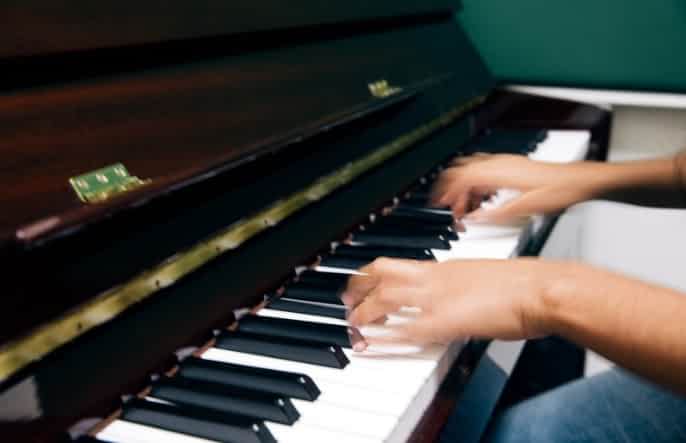
Mistake 5: Failing to Focus on Difficult Passages
Focusing on difficult passages is the key to mastering the piano. To practice the piano effectively, you need to practice the pieces for hours and hours until you can play them flawlessly. You also need to practice the difficult sections of the music endlessly so that you can master them.
Varying the tempo when playing a piece can help you focus on sections where you have not fully mastered the piece.
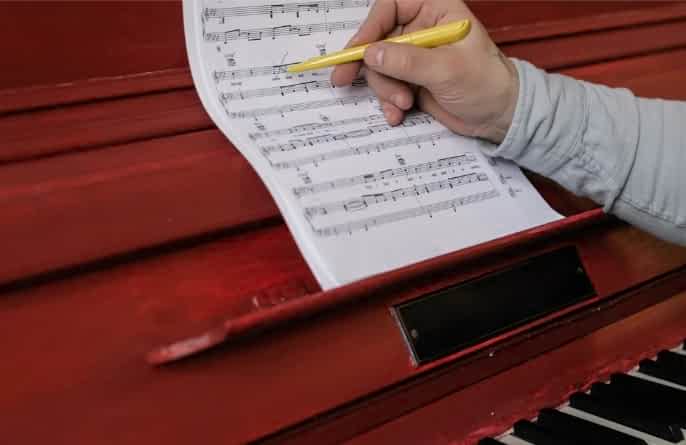
This is important because it helps you develop a sense of satisfaction and accomplishment from practising the music.
Practising with full concentration is more valuable than doing it without focus. You should fully engage with the music, and never entertain distractions during practice.
Beginner-Friendly Pianos We Recommend
Acoustic Pianos

PERFECT FOR: Student Musicians
FEATURES: Provides bright and modern sound with full-bodied projection
OTHER INFO: Compact cabinet for easy installation at home
Yamaha B1 Upright Acoustic Piano, Natural Cherry Satin
When you check the price above, you’ll see there are loads of great places to buy this item. Our personal favorite is Gear4music.
It is the largest music retailer in the UK and fast becoming the most respected online music shop in the US too. Their customer service is excellent, they have competitive prices, really fast shipping, and usually have the longest guarantee.
Most professional musicians use Gear4music, so there is no reason why you shouldn’t too!
- Built with acrylic key tops for a comfortable feel
- Combines a modern and compact cabinet with a bright and contemporary sound
- Professionally crafted by the renowned company Yamaha
- None!
The professional musician who wrote this article combined many things,
from the product build, manufacturer’s reputation through to feedback
from other users, to create our famous TedScore™.

PERFECT FOR: Beginner and professional musicians
FEATURES: Built with a classic grand piano look in a compact size to fit into most homes
OTHER INFO: The tapered, solid spruce soundboard provides a great sound
Kawai GL10 Acoustic Grand Piano Polished Ebony
When you check the price above, you’ll see there are loads of great places to buy this item. Our personal favorite is Gear4music.
It is the largest music retailer in the UK and fast becoming the most respected online music shop in the US too. Their customer service is excellent, they have competitive prices, really fast shipping, and usually have the longest guarantee.
Most professional musicians use Gear4music, so there is no reason why you shouldn’t too!
- Available with brass or silver finishes
- Offers excellent value for money
- None!
The professional musician who wrote this article combined many things,
from the product build, manufacturer’s reputation through to feedback
from other users, to create our famous TedScore™.
Digital Pianos

PERFECT FOR: Players at home or on the go
FEATURES: With ivory-like keys similar to that of an acoustic piano
OTHER INFO: The PHA-4 is one of Roland's premium keyboards
Roland FP-30X Digital Piano
When you check the price above, you’ll see there are loads of great places to buy this item. Our personal favorite is Gear4music.
It is the largest music retailer in the UK and fast becoming the most respected online music shop in the US too. Their customer service is excellent, they have competitive prices, really fast shipping, and usually have the longest guarantee.
Most professional musicians use Gear4music, so there is no reason why you shouldn’t too!
- Lightweight and compact
- Bluetooth connectivity for speakers and headphones is included
- Purchase includes three free months of access to Skoove - Roland's online learning platform
- None!
The professional musician who wrote this article combined many things,
from the product build, manufacturer’s reputation through to feedback
from other users, to create our famous TedScore™.
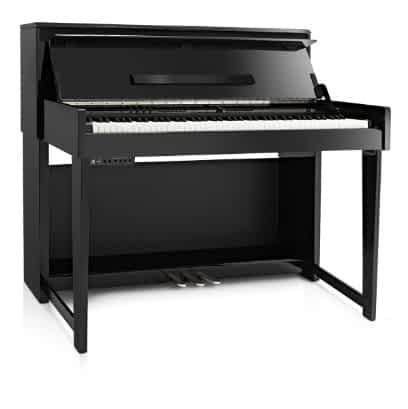
PERFECT FOR: Beginners and advanced players
FEATURES: Upright cabinet in polished ebony
OTHER INFO: With 256-note polyphony and a graded hammer action keybed
DP-90U Upright Digital Piano by Gear4music
When you check the price above, you’ll see there are loads of great places to buy this item. Our personal favorite is Gear4music.
It is the largest music retailer in the UK and fast becoming the most respected online music shop in the US too. Their customer service is excellent, they have competitive prices, really fast shipping, and usually have the longest guarantee.
Most professional musicians use Gear4music, so there is no reason why you shouldn’t too!
- USB connectivity is supported.
- Suitable for self-study/home learning
- None!
The professional musician who wrote this article combined many things,
from the product build, manufacturer’s reputation through to feedback
from other users, to create our famous TedScore™.
Keyboards

PERFECT FOR: Beginners and advancing players
FEATURES: With simple and easy-to-use functions for players
OTHER INFO: Built with a portable and compact design
Casio CT X700 Portable Keyboard
When you check the price above, you’ll see there are loads of great places to buy this item. Our personal favorite is Gear4music.
It is the largest music retailer in the UK and fast becoming the most respected online music shop in the US too. Their customer service is excellent, they have competitive prices, really fast shipping, and usually have the longest guarantee.
Most professional musicians use Gear4music, so there is no reason why you shouldn’t too!
- Comes with a song bank with over 150 songs and built-in piano lesson functions
- Designed with Casio's new AiX sound source
- You can play songs easily with its Step-Up Lesson system
- More expensive compared to other keyboards
The professional musician who wrote this article combined many things,
from the product build, manufacturer’s reputation through to feedback
from other users, to create our famous TedScore™.
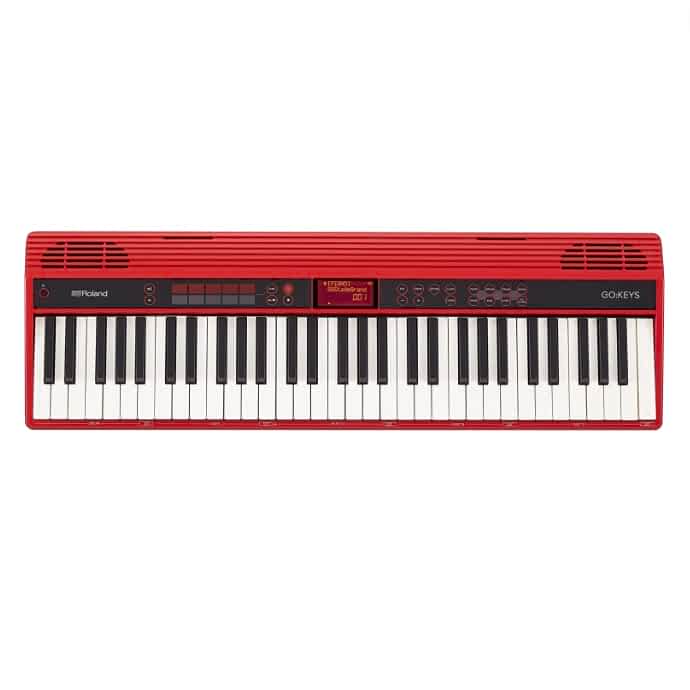
PERFECT FOR: Beginner players
FEATURES: Explore a range of styles and genres with a range of tones
OTHER INFO: Easy to carry with a slim and compact design
Roland Go: Keys Music Creation Keyboard
When you check the price above, you’ll see there are loads of great places to buy this item. Our personal favorite is Gear4music.
It is the largest music retailer in the UK and fast becoming the most respected online music shop in the US too. Their customer service is excellent, they have competitive prices, really fast shipping, and usually have the longest guarantee.
Most professional musicians use Gear4music, so there is no reason why you shouldn’t too!
- Create songs instantly with the Loop Mix function
- Play along to your favourite songs via Bluetooth audio
- On-board speakers don't sound very good
The professional musician who wrote this article combined many things,
from the product build, manufacturer’s reputation through to feedback
from other users, to create our famous TedScore™.
Piano Practice
Summary
Practising the piano is a simple and straightforward activity. You can practice playing anywhere and anytime – just you, the piano, and the music sheet.
But practising can be tricky too because it requires you to have the right mindset, practice routine, music theory and technique.
By following the simple tips we provided, we hope that you’ll be able to have a practice well spent on enhancing your skills.
Remember, it’s important to practice with a focus on specific areas you want to improve on. Don’t worry too much about trying to hit a certain time mark; rather, make sure you’re using your practice time efficiently.
Keep practising, stay curious, and don’t hesitate to ask for help whenever needed!
And before you go…
Don’t forget to look at our new article, How To Improve Finger Dexterity For The Piano.
FAQ's
Practising the piano is incredibly important for improving your skills and becoming better at playing. Even if you’re just starting out, doing it regularly will help you build up your technique and become more comfortable reading music.
Here’s what the experts suggest: aim for 20 to 30 minutes of consistent and deliberate practice, with specific goals in mind. Beginners may benefit most from shorter practice sessions, while more advanced pianists may prefer to practice up to 4 hours daily.
Whether you’re a beginner, an intermediate player, or an advanced pianist, practising daily helps you improve your skills and stay on top of your game. Plus, it makes your brain sharper and more efficient in areas such as memory, problem-solving ability, and multitasking.
Absolutely! With the abundance of online resources and tutorials available today, it’s easier than ever to get started independently. The piano is actually one of the easiest instruments to teach yourself, as it has a clear visual guide on the keyboard and is intuitive to play.




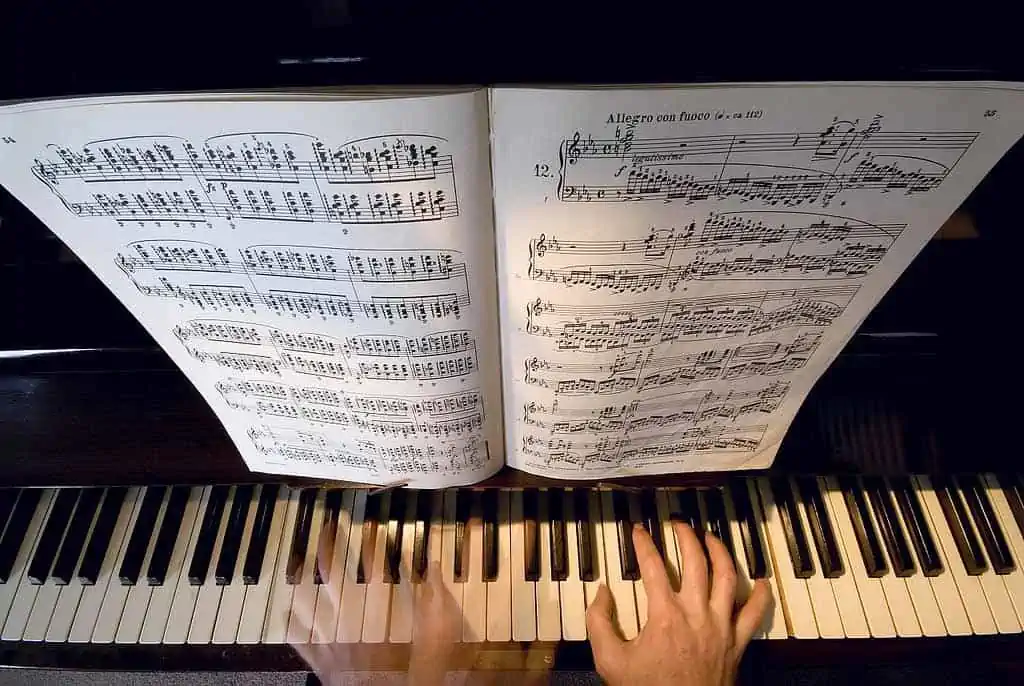







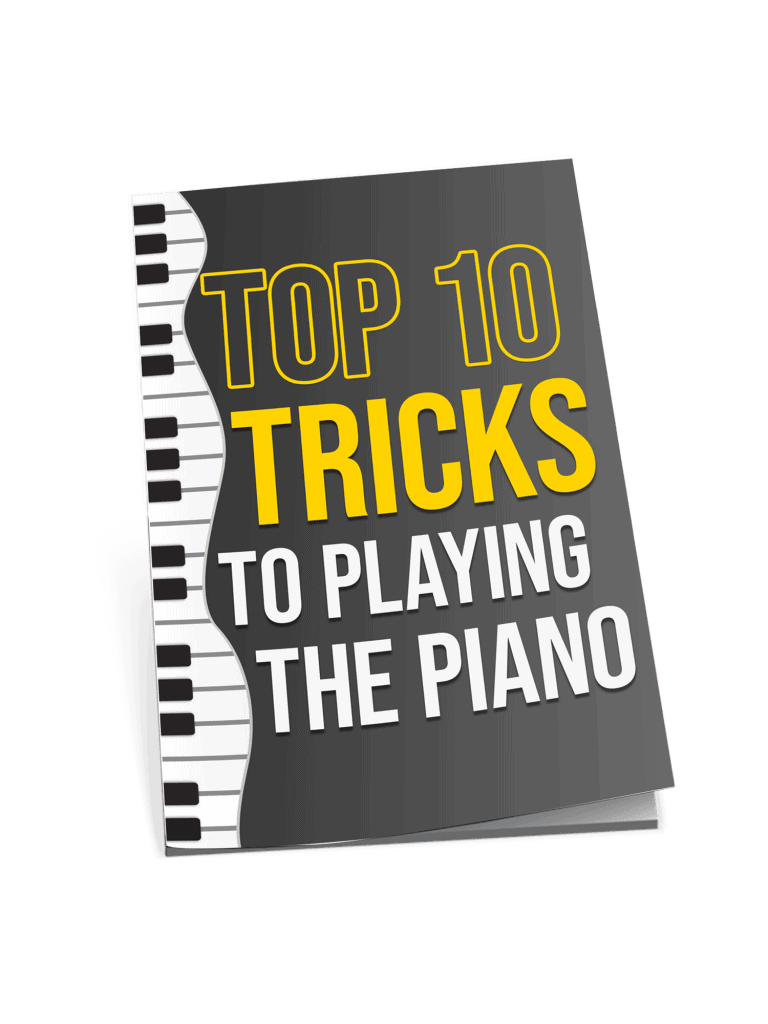
i dont get why everyone says practicing slow is so important i mean isnt it better to play at full speed to know how it really sounds. slow just makes it sound all weird and its harder to feel the rhythm that way.
Practicing slowly helps in building muscle memory and accuracy, pianoman123. Once you have the notes down, you can gradually increase your speed while maintaining precision.
Ah, the infamous look-at-your-hands mistake. If only my hands and brain would communicate better, maybe then I’d actually know where they are without peeking.
Regarding digital pianos, could you dive deeper into the type of key action and how it compares to the traditional acoustic pianos? Looking to make a switch but not sure if I should prioritize feel or sound. Great article, btw!
TommyTechie, if you’re especially concerned with the traditional playing feel, weighted keys on digital pianos mimic the resistance of acoustic piano keys quite well. And many brands are doing a great job in sound quality now too.
Really loved the bit about not rushing and appreciating your progress. It’s easy to get caught up in trying to be perfect from the get-go. Thanks for the reminder, Robert Emery!